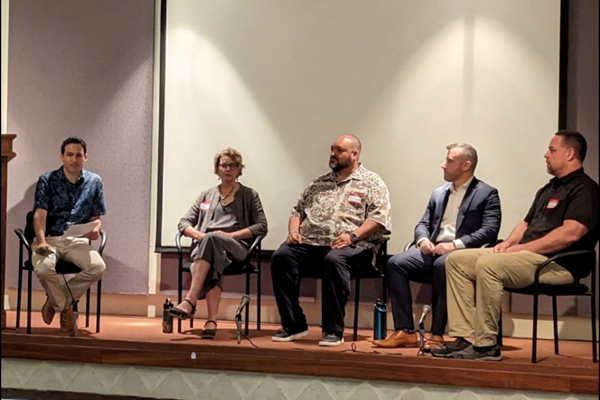Workshop touts electric vehicle benefits for Hawaii’s visitor industry
Nov 28, 2023

With more than 28,000 passenger electric vehicles (EVs) on Hawaii’s road (as of October 2023), the state is making good progress toward its clean ground transportation goals. However, to accelerate this transition, it’s important for Hawaii’s top industry — tourism — to play a big role as it accounts for one-third of the state’s economy.
Ulupono Initiative joined Hawaii policymakers and stakeholders from the energy, tourism, and transportation sectors at the Oahu Tourism Transportation Electrification Workshop on Oct. 30, 2023. Held at the Hawaii State Capitol, the workshop was organized by the Electrification Coalition with the goal of connecting industries and raising awareness for the need for more reliable and accessible EV charging systems.
A common theme of the day was the lack of publicly available charging stations, especially for visitors and industry employees. Representatives from the tourism industry, including the Kahala Resort, Marriott and Highgate, highlighted the number of EV charging stations their properties currently have. They identified a major challenge as the high cost of making electrical improvements to their facilities and parking garages to install more chargers.
While facilities grapple with balancing the need for more chargers and funding, the energy sector is looking at how increased charging impacts the electric grid.
Ulupono’s Director of Energy, Michael Colón, offered suggestions to mitigate potential grid issues. “We need to leverage time-of-use, where you incentivize people to charge during a time that’s most advantageous to the grid,” said Colón, who spent a decade working at Hawaiian Electric before joining Ulupono in 2023. “Also, demand response programs where you can leverage the vehicle’s battery to provide power back to grid or at least mitigate the grid’s impact by ramping up power input to the grid, which would be super crucial.”
Colón also mentioned that clean transportation should include non-vehicular options, such as bicycles or rail. It was a sentiment reiterated on the panel by Ben Sullivan, energy manager for the City & County of Honolulu, who highlighted that the City’s rail is electrically powered, while the bus system is on its way to being fully electrified.
With lawmakers and state agency representatives in attendance, multiple panelists pointed out the crucial role policy plays. Colón recommended tax incentives for the purchase of EVs for low- to moderate-income households. Other ideas discussed during the workshop were improving the permitting approval process for EV charging system installations and leveraging federal funding.
With the next legislation session little over a month away, Ulupono remains supportive of EV-related measures, especially those that ensure EV-ready infrastructure is in place for low-income housing and government buildings, as well as making technical assistance available to support both government and private fleet transitions to electric.

